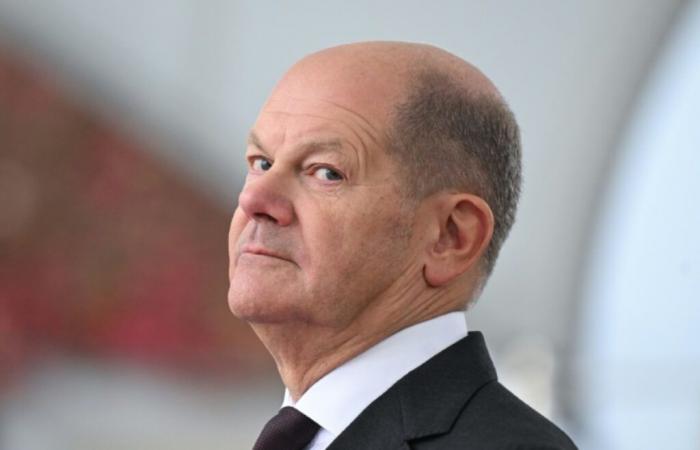German Chancellor Olaf Scholz at the Chancellery in Berlin, October 22, 2024 (AFP / RALF HIRSCHBERGER)
German Chancellor Olaf Scholz must face growing pressure to leave power immediately after the breakup of his fragile government coalition the day before, which plunged Europe’s largest economy into a serious crisis, and not wait until next spring.
The coalition between the chancellor’s Social Democrats (SPD), the Greens and the liberals of the FDP has “failed”, said Thursday the leader of the main opposition bloc, that of the conservative CDU-CSU, Friedrich Merz. According to him “there is no reason to ask the question of confidence in January” only in the Bundestag, the chamber of deputies, as Olaf Scholz wishes.
“We simply cannot afford to have a government without a majority for several months,” insisted Mr. Merz, who proposes holding early elections in the second half of January 2025.
The planned end of the government comes at the worst time for Germany, grappling with a serious industrial crisis, and for Europe which is worried about the repercussions for its trade and security of the election of Republican Donald Trump to the presidency. American presidential election.
During a speech, German President Frank-Walter Steinmeier called on the country’s political leaders to “reason” and “responsibility”, also stressing that the country “needs stable majorities and an effective government “.
The president, a social democrat like the chancellor, will be responsible for dissolving the Bundestag if Olaf Scholz loses, as expected, the question of confidence that he promised to submit to deputies in mid-January, with a view to elections. legislative elections in March – six months before the normally scheduled date.
– Reassure your partners –
Despite the earthquake caused by the collapse of his tripartite coalition in power since the end of 2021, Olaf Scholz wants to go in the evening to meetings organized in Budapest to meet his European counterparts and Ukrainian President Volodymyr Zelenski. He will try to allay their concerns.
NATO Secretary General Mark Rutte, also present in the Hungarian capital, said he was confident in Germany’s ability to fully play “its role on the world stage” despite the crisis.
The heterogeneous German government coalition was shattered following the dismissal Wednesday evening of Finance Minister Christian Lindner.
Cause of the rupture: deep differences on the budgetary and economic policy to follow, the social democrats and ecologists being in favor of reviving the stalled national economy through spending, while the liberals advocate social cuts and a strict budgetary discipline.
Mr. Lindner, also leader of the liberal FDP party (right), will be replaced in Finance by one of Olaf Scholz’s close advisors, Jörg Kukies, a 56-year-old former investment banker.
Most of the liberals left the government, with the exception of Transport Minister Volker Wissing, who announced that he wanted to remain in the ruling team and left his party with which he disagrees.
– Trump Ombre –
Olaf Scholz now leads a minority government and hopes to have a few months of priority legislation adopted, seeking a majority on a case-by-case basis, even if the opposition refuses him any support.
As for the 2025 budget, the preparation of which is at the origin of the current crisis, there is uncertainty. Failing adoption in Parliament, a minimum and reduced version could be applied from January.
Coalition ruptures are very rare in Germany. But the government team had been undermined for months by dissensions on the economy and immigration, and by personal quarrels.
“Fortunately it’s over,” headlined Der Spiegel magazine on Thursday, summarizing the general feeling in the country.
Olaf Scholz hoped that the election of Donald Trump, a fan of protectionism and diplomatic confrontations, would force his coalition to close ranks. But the opposite happened.
If elections were to be held tomorrow, the conservative opposition would come out on top with 32% of the votes according to a new poll Thursday by the Ipsos institute, carried out at the beginning of November, before the breakup of the coalition.
And Friedrich Merz would be the favorite to become chancellor. But he too would have difficulty forming a majority coalition, with the far-right AfD lying in wait in second position (18%) with whom he rejects any government alliance. The SPD is credited with 15%, the Greens with 11%, and the FDP with just 5%.






